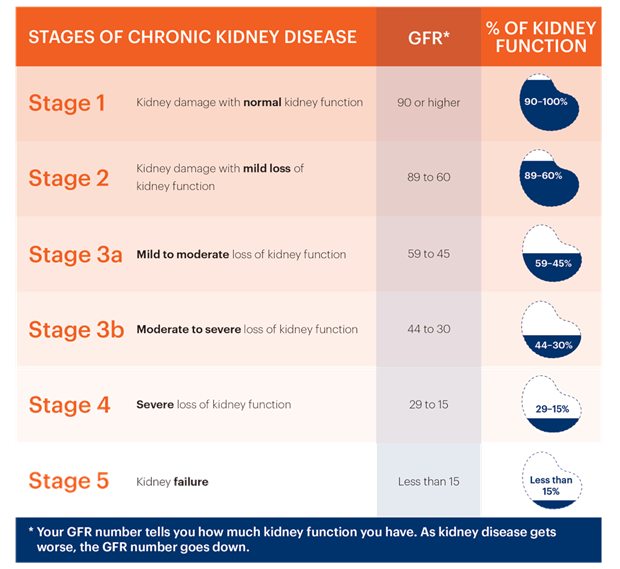In replying to a client's questions about the seriousness of the chronic kidney disease (CKD), the nurse knows that the stage of CKD is based on what?
Serum creatinine and urea levels.
Degree of altered mental status.
Glomerular filtration rate (GFR).
Total daily urine output.
The Correct Answer is C
The glomerular filtration rate is a measure of how effectively the kidneys filter waste and excess fluid from the blood. It is a key indicator of kidney function. CKD is staged based on the GFR, which provides an estimate of the percentage of normal kidney function remaining.
While serum creatinine and urea levels are important markers used to assess kidney function, they are not the sole criteria for staging CKD. The degree of altered mental status and total daily urine output are important clinical observations but are not used for staging CKD.

Nursing Test Bank
Naxlex Comprehensive Predictor Exams
Related Questions
Correct Answer is C
Explanation
School-age children typically have a growing awareness of their bodies and an understanding of potential harm or pain. They may fear procedures or treatments that involve physical discomfort, such as injections, blood draws, or invasive procedures. The fear of experiencing pain or bodily injury can cause anxiety and distress in school-age children.
It is important for the nurse to acknowledge and address the child's fear of pain or bodily injury by providing age-appropriate explanations, offering reassurance, and implementing strategies to minimize discomfort. This may involve using distraction techniques, providing emotional support, and ensuring proper pain management during procedures.
While loss of privacy and control, separation anxiety, and stranger anxiety can also be stressors for school-age children, the fear of pain or bodily injury is often a significant concern that may require specific attention and interventions from the nurse.
Correct Answer is ["Lithotripsy"," Encourage increased fluid intake"]
Explanation
Lithotripsy and Encourage increased fluid intake are the most important interventions.
Whether you are a student looking to ace your exams or a practicing nurse seeking to enhance your expertise , our nursing education contents will empower you with the confidence and competence to make a difference in the lives of patients and become a respected leader in the healthcare field.
Visit Naxlex, invest in your future and unlock endless possibilities with our unparalleled nursing education contents today
Report Wrong Answer on the Current Question
Do you disagree with the answer? If yes, what is your expected answer? Explain.
Kindly be descriptive with the issue you are facing.
